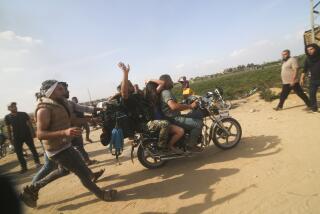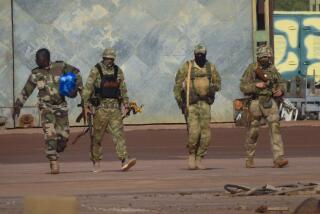China Says Radicals Led Attacks and Colluded With Bin Laden
- Share via
BEIJING — Keeping up the rhetoric against alleged terrorists in its westernmost outpost, the Chinese government Monday accused Muslim radicals of masterminding attacks throughout the country and colluding with the world’s most wanted man, Osama bin Laden.
Beijing said that “East Turkestan terrorists,” including Muslim militants among the Turkic-speaking Uighurs under Chinese rule in the Xinjiang region, were responsible for killing 162 people between 1990 and 2001 in a campaign of bombings, arson and poisonings. The assaults were designed to “sabotage national unity and create an atmosphere of terror,” the government said.
The attackers “brazenly preached a ‘holy war,’ the ‘elimination of pagans’ and the setting up of an ‘East Turkestan Republic,’ ” says a 10-page report issued to foreign journalists Monday by the State Council, China’s Cabinet.
Since the Sept. 11 attacks in the United States and the subsequent war in Afghanistan, Beijing has sought to link its problems in Xinjiang to the global anti-terrorism agenda.
The report alleges that Taliban leaders and Bin Laden aided Uighur and other extremists, promising training and a “fabulous sum” of money last year for their operations.
Chinese police have arrested more than 100 people who allegedly were trained in camps in Afghanistan and elsewhere and then crossed into China, the report says.
Critics accuse Beijing of using the international war on terrorism as political cover for its crackdown on dissent among Xinjiang’s Uighurs, many of whom resent Chinese rule and policies that they say are discriminatory and keep them mired in poverty.
China claims historical sovereignty over the area, a region rich in natural resources. The government has tried before to blame unrest on Muslim radicals carrying out a jihad, or holy struggle. However, in perhaps a deliberate echo of statements by President Bush, its new report says Chinese officials recognized that Islam “is a peace-loving religion.”
“The problem for them is that they can’t really establish that it is jihad,” said Dru C. Gladney, an expert on Central Asian peoples at the University of Hawaii. “When you talk to the Uighurs and the organizations, they always come back and say, ‘No, Islam is one issue among many’ ” that also include sovereignty and human rights.
The State Council’s report denies that the Chinese government is engaged in a campaign of suppression, despite periodic arrests and executions of suspected separatists in Xinjiang.
“If you go by population,” the Communist Party secretary of Xinjiang, Wang Lequan, said in a recently published interview, “the number of death sentences in Xinjiang is about the same proportion as in the rest of China.” The nation executes more people each year than the rest of the world combined.
“Generally speaking, Xinjiang society is stable,” Wang said. “People go about life contentedly.”
The only targets of the government crackdown are “a few core members and criminals,” the State Council report says, adding that those who support them are generously educated by the government and welcomed “back to the true path.”
The report accuses hard-core militants of plotting riots, assassinations, robberies, kidnappings and bombings, backed by an arsenal of antitank grenades, guns and explosives. Militants met in cell groups and trained in Xinjiang, as well as in foreign countries, it says.
Anticipating criticism of the Communist regime’s crackdown, the report warns other countries from applying “double standards” with regard to anti-terrorism activities.
The United States has so far refused to put the situation in Xinjiang under the umbrella of its anti-terrorism campaign. The issue is likely to come up next month during a presidential summit in Beijing between Bush and Chinese President Jiang Zemin.
More to Read
Sign up for Essential California
The most important California stories and recommendations in your inbox every morning.
You may occasionally receive promotional content from the Los Angeles Times.











